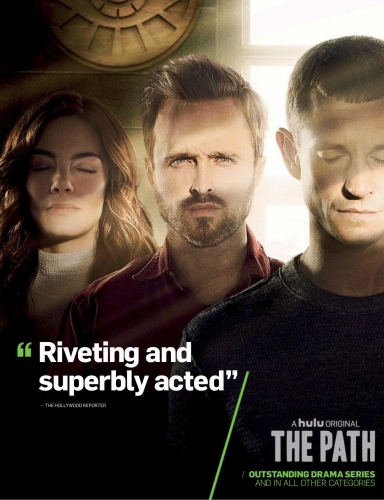Following three seasons of playing criminal profiler Will Graham on Hannibal, Hugh Dancy delighted fans when he returned to the screen so quickly after the cult NBC series was canceled, starring on The Path on Hulu.
The new series, created by Jessica Goldberg (writer and producer of Parenthood) and executive producers Jason Katims and Michelle Lee of True Jack Productions, saw the English actor trade serial killers for religious fanatics as Cal Roberts, an ambitious leader within a fringe religious movement.
While struggling to maintain some control of the Meyerist Movement, Cal had to battle his many internal demons, which didn’t always stay as deep or tucked away as he liked. Following the finale, the 41-year-old actor talked to ET his understanding of Cal, the joys of sermonizing onscreen, and being a star on Hulu:
Entertainment Tonight: First off, congratulations on the show. I was just curious, what was your take on The Path when you first joined? Did you realize what exactly it was going to do?
Hugh Dancy: I often realize how seriously Jessica Goldberg and the other writers were taking the question of faith, and the individual faith of the different characters, and that to me, is what made me want to commit to it. I suppose what I didn’t know that it was some form of a power struggle or a quest for power. I don’t think I knew — and I’m not even sure the writers knew — the degree to which they’d allow kind of hints of spirituality or mysticism, like genuine mysticism, to bleed into the show. I think that adds a whole different note to it.
One thing I liked, especially in terms of your character, this slow descent into a sinister character who’s really struggling for control of power. And I was curious, how did you balance how dark to go with each episode, and how much to let viewers see?
Certainly, the blueprint’s in the script overall, but I had to decide for myself how heavily to lean on the fault lines that are running through him, in terms of his background, his upbringing, and then there’s the extreme pressure that’s been brought to bear on him, just because of his isolation at the top of the movement, essentially, nobody else knowing what he knows. Both those things I was quite sympathetic towards, I felt like he was struggling to stay afloat on top of a really raging sea, not of his making, certainly. Then as he tried to navigate all of that, there was a secondary factor, which is that his own ambition, his own alpha-driven desire to control. That, I suppose, I have less sympathy for. Ultimately, just the goal there is to have you understand to some extent what’s driving him, and be a bit horrified by it, but not completely lose everybody’s sympathy.
Tell me about a favorite moment from filming this season.
I think I enjoyed — I mean, broadly speaking — the span of the character, in the sense that he can focus very, very intently on an individual and laser in on them. But he also has the capacity to stand in front of a big, big crowd and preach. It’s rare that you get the opportunity to flex all those muscles. He is a performer and he is theatrical. So, I got to indulge that. I suppose those sermonizing scenes and, particularly in the first episode, when I’m recounting the story of Plato’s cave. They were daunting but enjoyable.
I also love that Cal is listening to these self-help tapes about the idea of smiling and presenting and how you win people over. Did you think much at all about things like the facial expressions or your body movements, and what he would do in terms of getting control of people?
To a degree, I mean without sitting down and being exact about it, it factors into the way he carries himself, the way he speaks. If you have the kind of confidence that he does, it’s going to affect the way you sound. What I found interesting about him was that he, to some extent, he’s in a leadership role for a long time, but he’s been thrown into an entirely new and unexpected spotlight. All of which is basically unwanted on his part. He’s rapidly struggling to catch up. He’s got charisma but he’s also kind of doing Charisma 101.
Considering that you’re now on Hulu versus a traditional network, like NBC, are the expectations for the show different? What’s the experience like being on this kind of network?
Well, you know, it’s interesting because in terms of Hannibal, NBC was very — at least, from where I was sitting — very hands-off in a good way. Very quickly they gave the controls to [creator] Bryan Fuller. Maybe it would be the more typical network experience, where there are a lot of people looking over your shoulder. That said, I don’t know that anybody on the network would have commissioned The Path and then just put it out there in the world and had faith that it would slowly gain an audience. You just can’t do that.
What did you learn about yourself, filming the show?
What I learned was that regardless of how you define yourself in terms of your religion, or your beliefs, everybody has some desire for meaning and for belonging. So any one of us — including myself, I suppose — are potentially open, or I would say vulnerable, to this kind of experience that the characters on the show are having.
Source










































